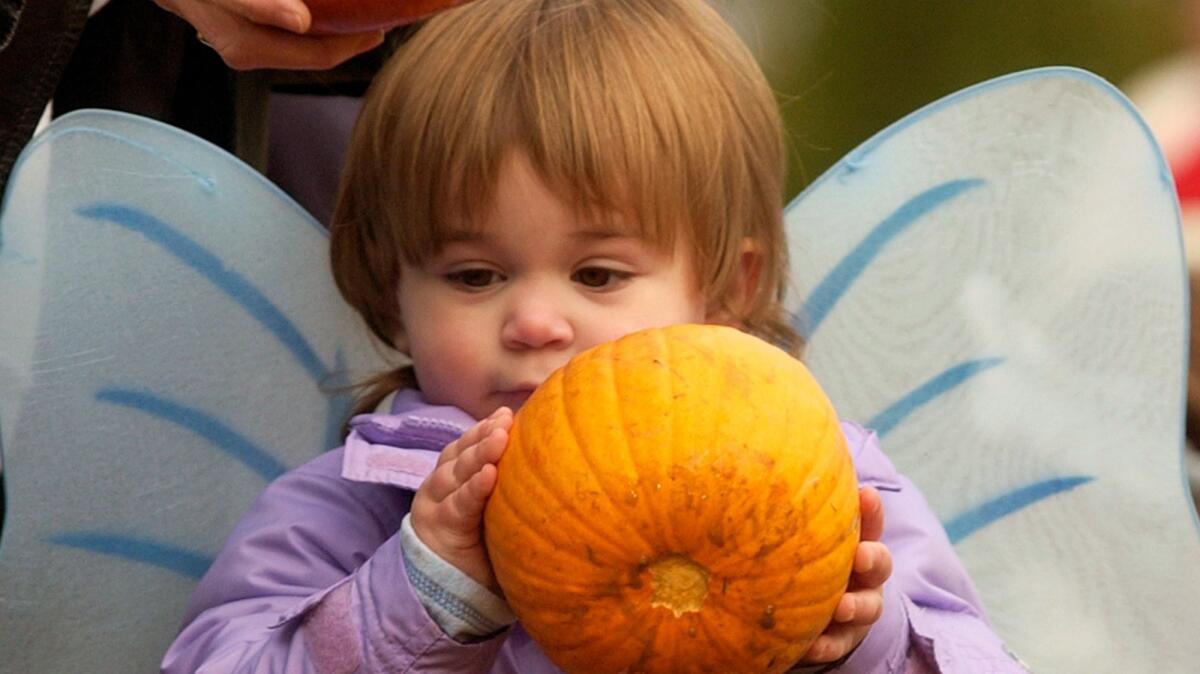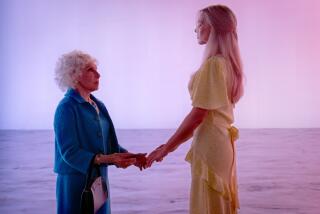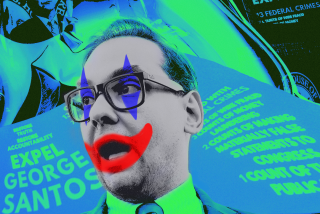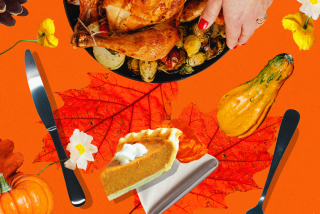Op-Ed: On Halloween, parents have no choice but to wade into fraught cultural politics

The street where I grew up, although peaceful, was no good for Halloween: few children, lots of ornery old people, a couple of real child-hating sociopaths. Even in those days before inflatable yard castles, the houses were notably absent of Halloween cheer — maybe a toothless jack-o’-lantern or two, nothing more. And as a child with no interest in dressing up, I had no particular use for costumes.
As a father, however, I love Halloween. I love that my street, already well-stocked with children of all ages, benefits from a mad, Pamplona-like infusion of new faces. They come to us from the more urban neighborhoods to the east and from the suburbs to the west, from apartment buildings and from McMansion-y precincts lacking sidewalks, drawn by our locally famous deep bags of candy.
Most of all, I love how much my four daughters love the holiday. They love the neighborhood events that precede the day, the puppet-making classes and the parade through our small village of shops.
Above all, they love their costumes. Blessed with all the passion for play, they enjoy conceiving their costumes, planning their execution, then handing over those plans to their mother, whose crafty, sewing side emerges once a year, to give her daughters the Halloween that she, as a Manhattan girl for whom trick-or-treating meant pressing “UP” in the elevator, never had. She is as game for the postmodern costume ideas of our eldest, Rebekah — in 2013, she went as a washer/dryer set — as for the classical preferences of our third daughter, Klara, who has been, inter alia, a flower and a ballerina.
May a pint-sized Jew dress up as mercenary soldier from feudal Japan?
Given the number of costumes our children have worn, about 30 since 2010, we’re fortunate that we’ve never had to say no to any idea for political reasons. Our kids don’t even know that Halloween has become as genuinely controversial as, say, Christmas in the eyes of a Fox News anchor. There is of course no real war on Christmas, but there are many skirmishes over Halloween costumes. Some of them are ridiculous, some necessary, but in either case parents today must pay attention.
Two years ago, a Yale instructor caused a national uproar when she sent an email objecting to a note cautioning students about culturally insensitive costumes. Last year, Disney had to pull from the market its costume of the Polynesian demigod Maui, featured in the movie “Moana.” The costume depicted tattooed brown skin, which understandably offended those who felt that it was blackface by another name: “Look, wear another ethnicity’s skin color!”
Last month, writing at the website raceconscious.org, one mother worried that letting her white daughter dress as the character Moana would be cultural appropriation — but letting her dress as the blond, blue-eyed Scandinavian princess Elsa from “Frozen” would send “the message that you have to be a certain way to be ‘beautiful.’”
On the one hand, this attention to the ethical implications of what used to be seen as harmless fun is long overdue. I am glad that we no longer think it’s OK to dress up our white children as tomahawk-wielding “Indians” for Halloween. White people should be particularly careful when portraying other cultures, but we all should tread lightly: If I saw a young child dressed as a Hasidic Jew for Halloween, with a black hat and fake side locks, I’d be horrified whether the boy was Irish Catholic, black, Navajo or Yazidi.
But maybe it’s not so simple. For example, what if the little boy dressed as an Orthodox Jew were a theater buff who just wanted to play Tevye, from “Fiddler on the Roof”? Well, that would be kind of cute. When I was 10, I was in love with musical theater; if you’d forced me to dress up for Halloween, I might have chosen a character from “Dreamgirls,” a play about African Americans. A couple of years earlier, I was obsessed with Diana Ross.
My parents would have had the good sense not to let me don blackface to play Diana Ross. But in cases like Tevye, we might listen to Erika Christakis, the Yale scholar who wrote in that notorious email: “Pretend play is the foundation of most cognitive tasks, and it seems to me that we want to be in the business of encouraging the exercise of imagination, not constraining it.”
Christakis is a former preschool teacher, and she’s surely right that, when it comes to the costume preferences of very little children, at least, “there is a difference between fantasizing about an individual character vs. appropriating a culture, wholesale.”
So far, we’ve been lucky in our children’s costume choices. But what if Ellie got obsessed with leprechauns? Or Anna with martial arts? May a pint-sized Jew dress up as mercenary soldier from feudal Japan? After nine seasons of “American Ninja Warrior” on NBC, I’d guess the answer is yes.
I’m glad that this year Anna’s going as a witch. Nobody, except everybody who practices nature-based religions that they identify with witchcraft, could get upset about that.
Mark Oppenheimer, a contributing writer to Opinion, is the host of Unorthodox, the podcast of Tablet magazine.
Follow the Opinion section on Twitter @latimesopinion or Facebook
More to Read
A cure for the common opinion
Get thought-provoking perspectives with our weekly newsletter.
You may occasionally receive promotional content from the Los Angeles Times.






